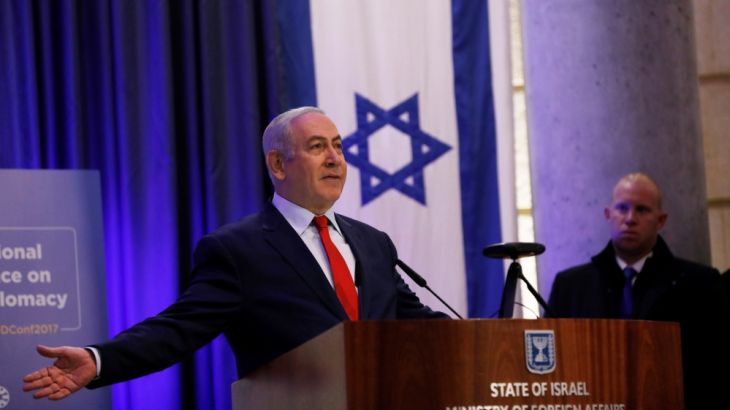Israeli PM sees ‘many’ following US on Jerusalem
Benjamin Netanyahu says his government in contact with ‘many’ countries who may recognise Jerusalem as Israel’s capital.

Prime Minister Benjamin Netanyahu has said more countries have indicated their willingness to recognise the city of Jerusalem as the capital of Israel, a day after the United States formally announced that it does.
US President Donald Trump on Wednesday, ignoring warnings from the international community, broke with decades of US policy and said Washington would recognise Jerusalem as the Israeli capital and move the US embassy there.
Keep reading
list of 4 itemsIsrael’s war on Gaza: List of key events, day 88
Israel expels Sub Labans from their home in Jerusalem’s Old City
What is ‘flag day’ in Jerusalem and why is it so controversial?
“I want to tell you that we are in touch with other countries that will make a similar recognition. And I have no doubt that the minute the US Embassy is moved to Jerusalem, and even beforehand, there will be a move of many embassies to Jerusalem. It is time,” said Netanyahu, addressing foreign diplomats at the Israeli foreign ministry on Thursday.
He did not name any countries that had indicated they would make such a move.
On Wednesday, the Czech foreign ministry indicated that it recognised Jerusalem “to be in fact the capital of Israel”, in a statement posted on its website.
“The Czech Republic currently, before the peace between Israel and Palestine is signed, recognises Jerusalem to be in fact the capital of Israel in the borders of the demarcation line from 1967,” said the statement, adding that it considered Jerusalem to be the future capital of both Israel and Palestine in the future.
“The ministry can start considering moving of the Czech embassy from Tel Aviv to Jerusalem only based on results of negotiations with key partners in the region and in the world.”
Calls for policy change
Trump said on Wednesday the US would begin moving its embassy to Jerusalem in the coming months, despite repeated warnings from around the world that the gesture negated the possibility of peace negotiations between the Israelis and Palestinians.
The president insisted that the US continues to back a two-state solution, which would see a new Palestinian state created alongside Israel, and that his announcement did not indicate that the US was taking a position on any final status issues, including contested borders.
Netanyahu welcomed the decision in a televised speech on Wednesday, calling it “an important step towards peace”.
Addressing diplomats at a conference on Thursday, Netanyahu called upon European states to change their policies towards Israel, stressing that he believed there was a distinction between several countries’ stated and “actual” policies.
“I ask that your actual policies towards Israel be no more and no less than the policies of the Arab world,” he said. “There has been a sea change, that is not reflected in public commentary, especially not these days.
“But if you knew the wealth of contacts, the wealth of friendships, the commonality of interests and in some basic sense … the hope for a better, freer more liberal future for our peoples, then you would understand that there has been a pivot in Israel’s standing not only in the world but also in the Middle East.”
The US move has received widespread criticism from governments around the world, with Palestinian leaders terming it an act of war.
Saudi Arabia, Jordan, Qatar, Bahrain, Egypt, Kuwait and others condemned the move.
Hamas leader Ismail Haniya said the decision had effectively “killed” the Israeli-Palestinian peace process.
“This decision has killed the peace process, has killed the Oslo [accord], has killed the settlement process,” he said. “The US decision is an aggression, a declaration of war on us, on the best Muslim and Christian shrines in the heart of Palestine, Jerusalem.”
Saeb Erekat, the chief Palestinian negotiator, told Al Jazeera that Trump had “disqualified his country from any possible role in the peace process”.